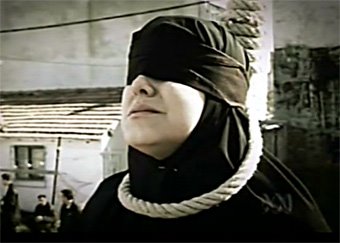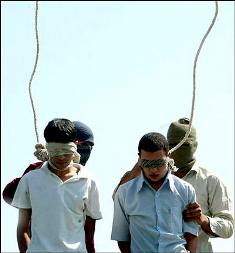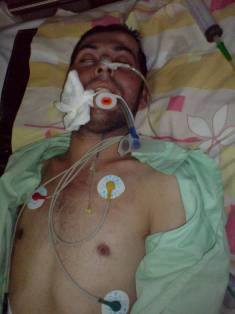

for the Protection of Human Rights Defenders
L’OBSERVATOIRE
pour la Protection des Défenseurs des Droits de l’Homme
EL OBSERVATORIO
para la Protección
de los Defensores de Derechos Humanos
URGENT APPEAL - THE OBSERVATORY
IRN 014 / 1108 / OBS 192
Sentencing / Harassment
Iran
November 17, 2008
The Observatory for the Protection of Human Rights Defenders, a joint programme of the International Federation for Human Rights (FIDH) and the World Organisation Against Torture (OMCT), requests your urgent intervention in the Islamic Republic of Iran:
Brief description of the situation:
The Observatory has been informed by reliable sources about the sentencing of Mr. Youssef Azizi Bani-Torof, a leading Ahwazi Arab author who writes both in Persian and Arabic, member of the Writers’ Association Kanoun-e Nevisandigan, and journalist for the Iranian daily newspaper Hamshahri, to five years of imprisonment.
According to the information received, on November 12, 2008, the Revolutionary Court of Tehran sentenced in appeal Mr. Youssef Azizi Bani-Torof to five years of imprisonment for having criticised the repression of the Arab speaking population in Ahvaz city, Khuzestan, in April 2005. As of issuing this urgent appeal, Mr. Youssef Azizi Bani-Torof remained free pending his appeal before the Supreme Court.
Mr. Youssef Azizi Bani-Torof had been arrested on April 25, 2005 after his participation to a peace conference in which he condemned the excessive use of force against participants to demonstrations that took place on April 15, 2005, in Ahvaz, to denounce the increase in discrimination and suppression of cultural rights faced by the Arab population in Khuzestan.
After being detained during 50 days in the Evin prison, he was released on a one billion Rial bail. On August 10, 2008, more than three years later, he was sentenced to five years in prison and then lodged an appeal against the decision.
The Observatory expresses its deep concern about Mr. Youssef Azizi Bani-Torof’s harsh sentencing as it seems to merely sanction his activities of promotion of human rights principles and strongly condemns the increasing repression of the Iranian authorities against human rights defenders.
The Observatory further wishes to remind that Iran made a commitment to “uphold the highest standards in the promotion and protection of human rights”[1] by presenting its candidacy to the Human Rights Council 2006 election, and had insisted in this regard that the country has “continuously put great efforts into safeguarding the status and inherent dignity of the human person as well as the promotion and protection of human rights and fundamental freedoms”[2]; however the conviction of Mr. Bani-Torof for simply defending human rights, as well as the processes leading to the conviction, such as his two month detentions, contradict such a commitment and undo such efforts.
Actions requested:
Please write to the authorities in Iran urging them to:
i. Guarantee in all circumstances the physical and psychological integrity of Mr. Youssef Azizi Bani-Torof;
ii. Respect in all circumstances his right to a fair trial according to international human rights standards;
iii. Put an end to all acts of harassment - including at the judicial level - against Mr. Youssef Azizi Bani-Torof as well as against all Iranian human rights defenders;
iv. Conform with the provisions of the UN Declaration on Human Rights Defenders, adopted by the General Assembly of the United Nations on December 9, 1998, especially its Article 1, which states that “everyone has the right, individually and in association with others, to promote and to strive for the protection and realisation of human rights and fundamental freedoms at the national and international levels”, Article 6 (b) which stipulates that “everyone has the right […] freely to publish, impart or disseminate to others views, information and knowledge on all human rights and fundamental freedoms”, as well as Article 12(2), which provides that “the State shall take all necessary measures to ensure the protection by the competent authorities of everyone, individually and in association with others, against any violence, threats, retaliation, de facto or de jure adverse discrimination, pressure or any other arbitrary action as a consequence of his or her legitimate exercise of the rights referred to in the present Declaration”;
v. Ensure in all circumstances the respect for human rights and fundamental freedoms in accordance with the Universal Declaration of Human Rights and with international and regional human rights instruments ratified by the Islamic Republic of Iran.
Addresses:
· Leader of the Islamic Republic, His Excellency Ayatollah Sayed Ali Khamenei, The Office of the Supreme Leader, Shoahada Street, Qom, Islamic Republic of Iran, Faxes: + 98.21.649.5880 / 21.774.2228, Email: info@leader.ir / istiftaa@wilayah.org / webmaster@wilayah.org;
· President, His Excellency Mahmoud Ahmadinejad, the Presidency, Palestine Avenue, Azerbaijan Intersection, Tehran, Islamic Republic of Iran, Fax: + 98.21.649.5880, E-mail: dr-ahmadinejad@president.ir;
· Head of the Judiciary, His Excellency Mr. Mahmoud Hashemi Shahrudi, Ministry of Justice, Park-e Shahr, Tehran, Islamic Republic of Iran, Fax: +98.21.879.6671 / +98 21 3 311 6567, Email: Irjpr@iranjudiciary.com;
· Minister of Foreign Affairs, His Excellency Mr. Manuchehr Motaki, Ministry of Foreign Affairs, Sheikh Abdolmajid Keshk-e Mesri Av, Tehran, Islamic Republic of Iran, Fax: + 98.21.390.1999, Email: matbuat@mfa.gov;
· Permanent Mission of the Islamic Republic of Iran, Chemin du Petit-Saconnex 28, 1209 Geneva, Switzerland, Fax: +41 22 7330203, Email: mission.iran@ties.itu.int;
· Ambassador Mr. Ahani, Embassy of Iran in Brussels, avenue Franklin Roosevelt, 15 A. 1050 Bruxelles, Belgium, Fax: + 32 2 762 39 15. Email: iran-embassy@yahoo.com.
Please also write to the diplomatic mission or embassy of Iran in your respective country.
***
Geneva-Paris, November 17, 2008
Kindly inform us of any action undertaken quoting the code of this appeal in your reply.
The Observatory, a FIDH and OMCT venture, is dedicated to the protection of Human Rights Defenders and aims to offer them concrete support in their time of need. The Observatory was the winner of the 1998 Human Rights Prize of the French Republic.
To contact the Observatory, call the emergency line:
E-mail: Appeals@fidh-omct.org
Tel and fax FIDH + 33 (0) 1 43 55 20 11 / +33 1 43 55 18 80
Tel and fax OMCT + 41 (0) 22 809 49 39 / + 41 22 809 49 29
FIDH
International Federation for Human Rights
17, Passage de la Main d’Or
75 011 Paris, France
OMCT
World Organisation Against Torture
Case postale 21 - 8 rue du Vieux-Billard
1211 Geneva 8, Switzerland
[1] In accordance with GA resolution A/RES/60/251 establishing the Human Rights Council.
[2] http://www.un.org/ga/60/elect/hrc/iran.pdf































































